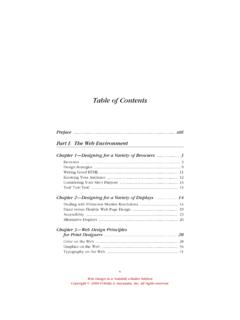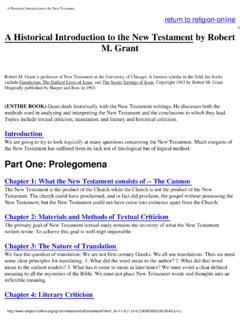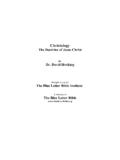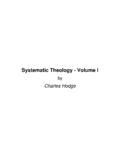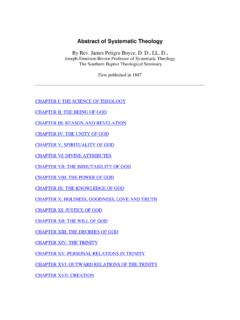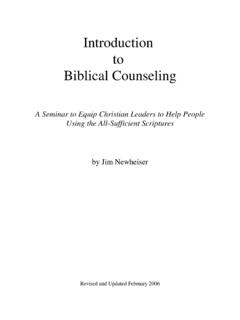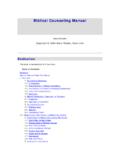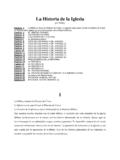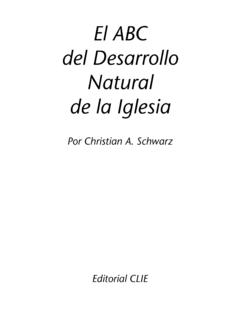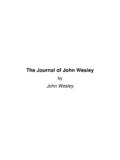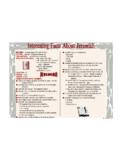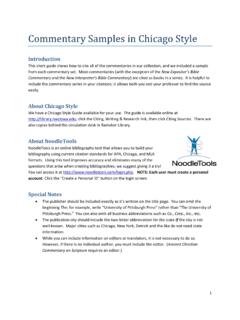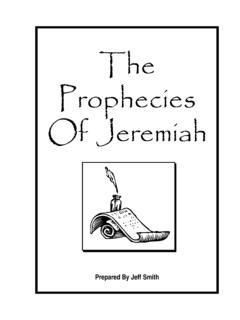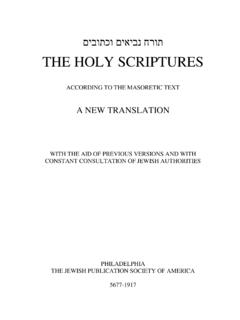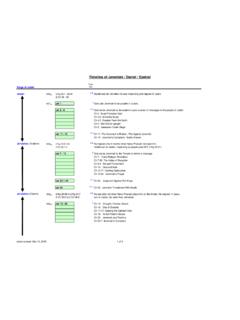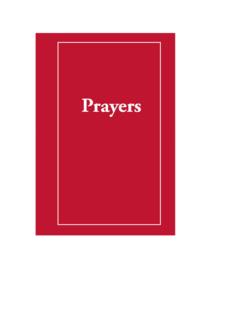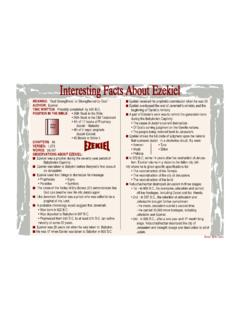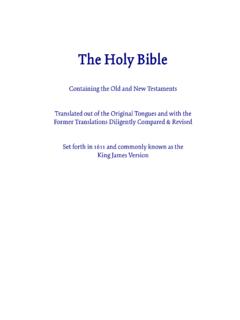Transcription of Notes on Jeremiah - NTSLibrary
1 Copyright 2006 by Thomas L. Constable Published by Sonic Light: Notes on Jeremiah 2006 Edition Dr. Thomas L. Constable Introduction TITLE The title of this book derives from its writer, the late seventh and early sixth-century Judean prophet Jeremiah . The book occupies the second position in the Latter Prophets section of the Hebrew Bible after Isaiah and before Ezekiel, which accounts for its position in the Septuagint and most modern translations. The meaning of " Jeremiah " is not clear. It could mean "Yahweh founds (or establishes)," "Yahweh exalts," "Yahweh throws down," "Yahweh hurls," or "Yahweh loosens (the womb)." WRITER The composition and structure of Jeremiah , discussed below, have led many scholars to conclude that an editor or editors (redactors) probably put the book in its final form.
2 Many conservatives, however, believe that Jeremiah himself was responsible for the final form, though it is clear that the book went through several revisions before it reached its final canonical form. Jeremiah could even have written the last chapter, which describes events that took place about 25 years after the next latest events, since he would have been approximately 83 years old, assuming he was still alive. Clearly, Jeremiah 's secretary, Baruch, provided the prophet with much assistance in writing the material and possibly arranging it in its final form (36:17-18; 45:1). Baruch was to Jeremiah what Luke was to Paul: his companion, amanuensis, and biographer. The book bears marks of having been assembled by one person at one time. "There is no satisfactory reason for doubting that Jeremiah himself was the author of the entire book .
3 "1 The book of Jeremiah tells us more about the prophet Jeremiah than any other prophetic book reveals about its writer. It is highly biographical and We know more about his personality than that of any other prophet. 1 Edward J. Young, An Introduction to the Old Testament, p. 243. See also Eugene H. Merrill, Kingdom of Priests: A History of Old Testament Israel, p. 458. 2 Scholars refer to the autobiographical sections (10:23-25; 11:18 12:6; 15:10-14, 15-21; 17:9-11, 14-18; 18:18-23; and 20:7-13, 14-18) as " Jeremiah 's confessions." , John F. Graybill, " Jeremiah ," in The Wycliffe Bible Commentary, p. 656; J. A. Thompson, The book of Jeremiah , pp. 88-92. 2 Dr. Constable's Notes on Jeremiah 2006 Edition Jeremiah 's hometown was Anathoth, a Levitical town in the territory of Benjamin three miles northeast of Jeremiah 's father, Hilkiah, was evidently a descendant of Abiathar, a descendant of Eli (1 Sam.)
4 14:3). Thus Jeremiah had ancestral connections to Shiloh, where the tabernacle stood during the judges period of Israel's history (the amphictyony). Jeremiah referred to Shiloh in his Temple Sermon (7:12, 14; 26:6). Abiathar was the sole survivor of King Saul's massacre of the priests at Nob, also only a few miles northeast of Jerusalem (1 Sam. 22:20). Later Solomon exiled Abiathar to Anathoth, where Abiathar had property, because Abiathar had proved unfaithful to David (1 Kings 2:26). Jeremiah 's father Hilkiah may have been the high priest who found the book of the Law in the temple during Josiah's reforms (1 Kings 2:26).4 Even though Jeremiah came from a priestly family (like Ezekiel and Zechariah), there is no indication that he ever underwent training for the priesthood or functioned as a priest.
5 Jeremiah 's date of birth is a matter of dispute. Most scholars believe he was born about 643 , one year before the end of King Manasseh's He probably died in Egypt. "A late, unattested tradition, mentioned by Tertullian, Jerome, and others, claims that the people of Tahpanhes [in Egypt] stoned Jeremiah to death."6 His call to the prophetic office came in 627 (1:2; 25:3) when he would have been about 20 years His ministry as a prophet may have extended over 40 He evidently exercised his ministry mainly during periods of crisis in Judah's history, though it is impossible to date some of his prophecies. His ministry involved prophesying about Judah and the other ancient Near Eastern nations of his time (1:10). Judging by Jeremiah 's autobiographical remarks and the narrative information about him in this book , his life was a sad one, one long martyrdom.
6 He probably encountered more opposition from more enemies than any other prophet. Much of it stemmed from his message to his own people: unconditional surrender to Babylon. "No braver or more tragic figure ever trod the stage of Israel's history than the prophet Jeremiah .. 3 See the map of Palestine at the end of these Notes . 4R. K. Harrison, Introduction to the Old Testament, p. 802. 5 For a clear discussion of the problem, see Thompson, pp. 50-56. See Edwin R. Thiele, A Chronology of the Hebrew Kings, p. 75, for the dates of Israel and Judah's kings. The commentators give dates that sometimes vary by one or two years when describing the same events. This is because the Babylonians used one method of dating and the Israelites another, at least for some periods of their history.
7 There is still some confusion about these dates. I have usually followed the scheme set forth by Thiele. 6 Charles Lee Feinberg, " Jeremiah ," in Isaiah-Ezekiel, vol. 6 of The Expositor's Bible Commentary, p. 360. 7 See my comments on 1:6. 8 Several reliable scholars believed that Jeremiah 's ministry ended about 587 or a little later. See, for example, Peter C. Craigie, Jeremiah 1 25, p. xlv; Merrill, p. 467; and Thompson, p. 116. Charles H. Dyer, " Jeremiah ," in The Bible Knowledge Commentary: Old Testament, p. 1123; and Leon J. Wood, The Prophets of Israel, p. 330, believed it continued to at least 582 Craigie, by the way, wrote only the commentary on 1:1 8:3 and the Introduction in this volume. Dyer usually provided good explanations of time references that occur throughout Jeremiah . 2006 Edition Dr.
8 Constable's Notes on Jeremiah 3 " Jeremiah was hated, jeered at, ostracized ( , chs. 15:10f., 17; 18:18; 20:10), continually harassed, and more than once almost killed ( , chs. 11:18 to 12:6; 26; 36)."9 Jeremiah is the only prophet who recorded his own feelings as he ministered, which makes him both very interesting and very helpful to other ministers. Some authorities believe that his greatest contribution to posterity is his personality. ".. by birth a priest; by grace a prophet; by the trials of life a bulwark for God's truth; by daily spiritual experience one of the greatest exponents of prophetic faith in his unique relation to God; by temperament gentle and timid, yet constantly contending against the forces of sin; and by natural desire a seeker after the love of a companion, his family, friends, and above all, his people which were all denied him.
9 "10 "He was a weeping prophet to a wayward people."11 There are many similarities between Jeremiah and Hosea. Hosea announced the fall of Samaria, and Jeremiah announced the fall of Jerusalem. Both prophets experienced much personal tragedy. In his ideas as well as in his vocabulary, Jeremiah demonstrates familiarity with Hosea's prophecies. There are also affinities with Job and the Psalter. There are also remarkable parallels between Jeremiah and the Lord Jesus Christ. No other prophet bears as many striking similarities to the Savior, which makes him the most Christ-like of the prophets. The people of Jesus' day noted these similarities (Matt. 16:14). In both cases Jerusalem was about to fall, the temple would suffer destruction soon, the worship of Yahweh had become a formalistic husk, and there was need for emphasis on individual relationship with God.
10 Both men had a message for Israel and the whole world. Both of them used nature quite extensively for illustrative purposes in their teaching. Both came from a high tradition: Jeremiah from a priestly, prophetic heritage and Jesus from a divine, royal position. Both were very conscious of their call from God. Both condemned the commercialism of temple worship in their day (7:11: Matt. 21:13). Their enemies charged both of them with political treason. Both experienced persecutions, trials, and imprisonments. Both foretold the destruction of the temple (7:14; Matt. 13:2). Both wept over Jerusalem (9:1; Luke 19:41). Both condemned the priests of their day. Both experienced rejection by members of their own families (12:6; John 1:11). Both were so tenderhearted that some Jewish leaders identified them with the Suffering Servant of Isaiah 53.
